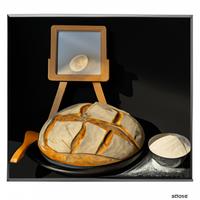
1 serving (56 grams) contains 150 calories, 5.0 grams of protein, 1.0 grams of fat, and 30.0 grams of carbohydrates.

Log this food in SnapCalorie

Nutrition Information
Calories |
634.0 | ||
|---|---|---|---|
% Daily Value* |
|||
| Total Fat | 4.2 g | 5% | |
| Saturated Fat | 0.8 g | 4% | |
| Polyunsaturated Fat | 0 g | ||
| Cholesterol | 0 mg | 0% | |
| Sodium | 1690.7 mg | 73% | |
| Total Carbohydrates | 126.8 g | 46% | |
| Dietary Fiber | 4.2 g | 15% | |
| Sugars | 4.2 g | ||
| protein | 21.1 g | 42% | |
| Vitamin D | 0 mcg | 0% | |
| Calcium | 84.5 mg | 6% | |
| Iron | 6.3 mg | 35% | |
| Potassium | 211.3 mg | 4% | |
* Percent Daily Values are based on a 2,000 calorie diet. Your daily values may be higher or lower depending on your calorie needs.
Food Attributes
Source of Calories
About San francisco sourdough
San Francisco Sourdough is a tangy, artisan-style bread with roots in Gold Rush-era California, where its unique flavor was perfected. Made from simple ingredients—flour, water, and salt—it relies on a natural fermentation process using wild yeast and bacteria, known as a sourdough starter. This fermentation gives the bread its distinctively sour taste and chewy texture. As part of its nutritional profile, sourdough is easier to digest than conventional bread due to the breakdown of complex carbohydrates during fermentation. It also contains gut-friendly probiotics in its starter, though many are lost during baking. While it provides carbohydrates for energy and small amounts of protein, sourdough's healthfulness depends on portion size and balance within a diet, as it can be high in sodium depending on the recipe. Its cultural significance and flavor make it a quintessential staple of American cuisine, particularly in the Bay Area.



